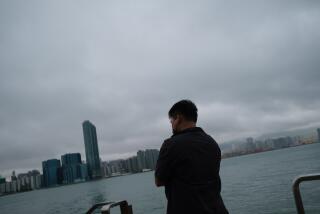Seeking the Key to Hong Kong’s Great Success
- Share via
HONG KONG — When former British Prime Minister Margaret Thatcher returned this week to the colony she agreed in 1984 to give back to China, she found a city ascendant. Despite predictions that the hand-over would cause economic gloom and a mass exodus, Hong Kong, with its profusion of Rolls-Royces, cellular telephones and stock-market millionaires, has spectacularly quashed fears of economic disaster before China takes over July 1.
The question Thatcher leaves in her wake is: Who gets the credit?
Hong Kong’s British governor, Chris Patten, who expanded political participation in the territory, boasts that the boom shows the “power that economic and political freedoms have when they are allowed to flourish together.” China’s top central banker, Dai Xianglong, prefers to credit the “prosperity and stability” of the neighboring mainland.
And Hong Kong people like to take the credit for themselves. “We’re diligent, hard-working, energetic people,” says Henry Tang, a prominent industrialist and legislator. “We made Hong Kong what it is today.”
The truth no doubt lies amid these conflicting claims. But the answer to the question is more than a matter of honor. With Hong Kong reverting to Chinese control in two months, after a century and a half of British rule, determining what lies behind its success is crucial to understanding its prospects for the future. If those responsible for the territory’s dynamism don’t recognize its ingredients, analysts ask, how can they maintain it?
As Chinese officials try to stir up ethnic pride before the return to the motherland, few want to acknowledge a debt to British colonial rule. Chinese President Jiang Zemin recently said: “Hong Kong’s prosperity in the past cannot be attributed, as some have suggested, to an independent judiciary and a free system of the press but mainly to the creativity of the Hong Kong people themselves.”
Hong Kong’s 6.4 million people, almost half of whom fled here from China, are called the once-barren territory’s “only natural resource.” Driven by a refugee mentality, they have transformed the colony with their hard work, emphasis on education, entrepreneurship and investment via regional family networks, analyst David Dodwell says. Hong Kong workers’ average wage--more than $25,000--surpassed that of their colonial masters a decade ago.
But Britain provided the framework to underpin that dynamism, notes Dodwell, who co-wrote “The Hong Kong Advantage,” based on a Harvard study of Hong Kong’s competitiveness. He warns: “We must be sure we don’t throw the baby out with the bathwater.”
There’s no question that Britain has left its institutional mark. Bewigged judges run courts here according to Commonwealth Law and enunciate verdicts in the queen’s English. Lawmakers ruminate under the graceful arches of the Legislative Council building and address each other as “honorable member.” Civil servants run a masterful hive of British bureaucracy; the police are generally regarded as clean and efficient.
Colonial trappings may change, but legislator Tang hopes the legal legacy will not. “We won’t call it ‘the British element’ anymore--we’ll just call it ‘the rule of law,’ ” he says in his council chambers. “But it’s very deeply rooted here.”
Such institutions--plus a free press and a rambunctious legislature--have yet to take root in China. Yet Beijing points to China’s double-digit growth as evidence that they are unnecessary for Hong Kong’s success.
That is a danger signal to those here who believe that Hong Kong has been voted the world’s freest and one of its most competitive economies precisely because of the combination of unrestricted flows of information, ideas and money.
“There’s a need for internal education in China so people understand what’s happening here,” says Victor Fung, chairman of the Hong Kong Trade Development Council. “That should help justify why Hong Kong should get special treatment. It’s not just another Chinese city.”
Hong Kong can’t do without China: Beijing is its largest foreign investor and has helped fuel its growth.
Still, the territory is reluctant to take economic lessons from its increasingly confident neighbor just yet. “If Chinese officials think they know as much about Hong Kong people and about how to run Hong Kong,” writes political commentator Frank Ching, “they’ll be tempted to interfere in Hong Kong affairs and seek to run Hong Kong themselves.”
More to Read
Sign up for Essential California
The most important California stories and recommendations in your inbox every morning.
You may occasionally receive promotional content from the Los Angeles Times.










